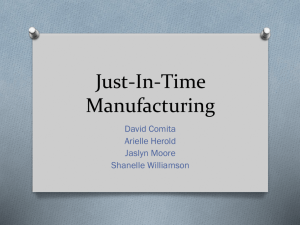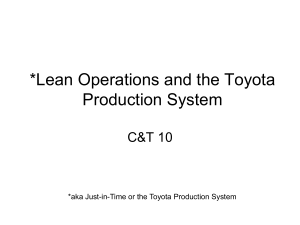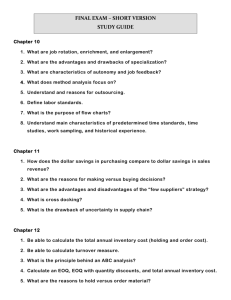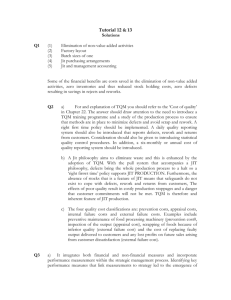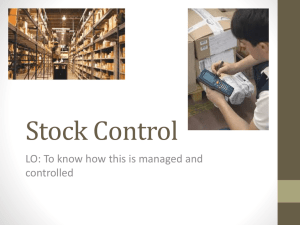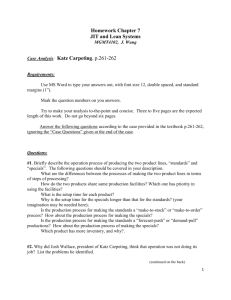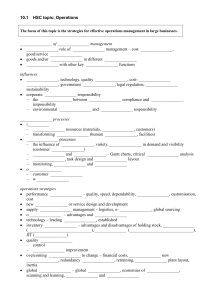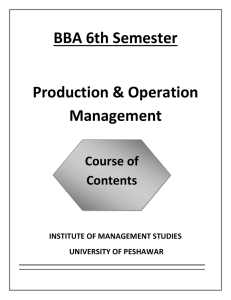Just In Time Production By: Ahmed Al Shawi Timmy Tang
advertisement
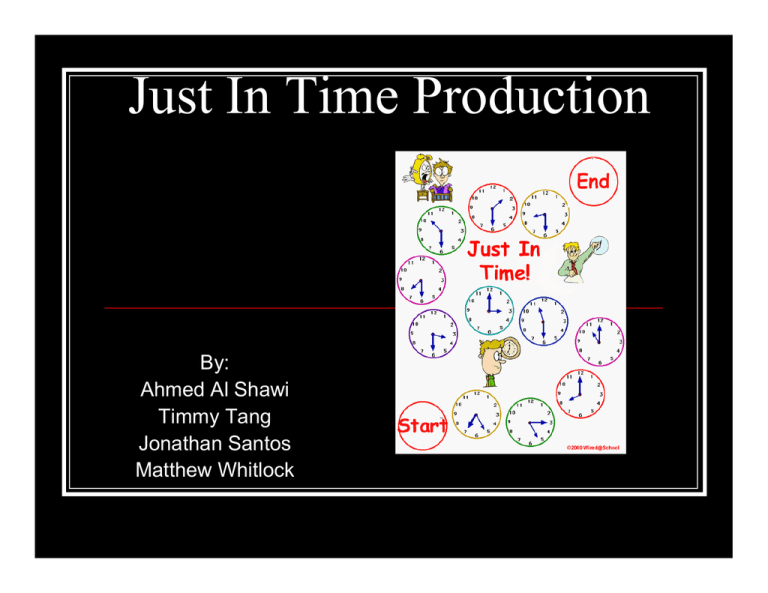
Just In Time Production By: Ahmed Al Shawi Timmy Tang Jonathan Santos Matthew Whitlock Table of Contents JIT Philosophy History of JIT Founder of JIT Key Elements of JIT Order Winners and Qualifiers Requirements for JIT Process of JIT Problems of JIT Case Study Questions Study Guide JIT Philosophy A systems approach to developing and operating a manufacturing system Based on the total elimination of waste and producing only the necessary units in the necessary quantities at the necessary time by bringing production rates exactly in line with market demand Inventory is seen as incurring costs instead of adding value Ideas: Statistics Industrial engineering Production management Behavioral science History of JIT Originated in Japan and generally associated with the Toyota motor company Initially known as the "Toyota Production System". Taiichi Ohno is most commonly credited as the father/originator of this way of working JIT philosophy arouse out of two things Japan’s wish to improve its production quality Kaizen (Continuous Improvement) After the Second World War the president of Toyota said "Catch up with America in three years, otherwise the automobile industry of Japan will not survive". Founder of JIT Pioneered by Taiichi Ohno in Japan Father of Toyota Production system (Lean Manufacturing) Wrote several books about the system “Toyota Production” “Just In Time Today Tomorrow” “Toyota Production System: Beyond Large Scale Production” Employee at first then rose through ranks and became an executive Key Elements of JIT Reduce and eliminate setup times Reduce lot sizes (manufacturing and purchase) Preventive maintenance Flexible work force Small-lot (single unit) conveyance Require supplier quality assurance Reduce Lead Times (production and delivery) Order Winners & Qualifiers of JIT Customization Improved Quality Time consumption Flows of goods from warehouse to shelves are improved Focuses on processes rather than results Focuses more on team dynamics Requirements for JIT Each manufacturing process is different in terms of goals, production requirements, etc. To establish a JIT manufacturing system, every department must have commitment to a common goal, which also needs to be supported by the company’s top management. Financial commitment is necessary during the early stages of development and implementation to change over to a JIT system. Management needs to be at the top of their game in the early transition phase of JIT. Trust and commitment between the supplier and the customer is a must. Process of JIT 1. Buyer receives order 2. Cases the order 3. Prints case labels 4. Creates ship notice and invoice 5. Connects and sends documents 1. Specify value in the eyes of the customer 2. Identify the value stream and eliminate waste 3. Make value flow at the pull of the customer 4. Involve and empower employees 5. Rinse and Repeat Problems with JIT Major problem is it leaves the supplier and downstream consumers open to supply shock With shipments coming into a company several times a day they are susceptible to an interruption in the flow Most companies have to use two suppliers for most assemblies Case Study Company Name: Unitco Al Bahrain Founder: Dr. Ahmed Al Shawi Established in 1975 Omega paints, and Artcon construction company, Building materials TPS Methods – Pull System Components Video Works Cited "Advances in Competitiveness Research." 13 (1999). Academic OneFile. Wentworth Alumni Library, Boston. 11 Apr. 2007. Keyword: Lean Manufacturing. Bodek, Norman. "Lean Manufacturing History." Strategos. 16 Apr. 2007 <http://www.strategosinc.com/just_in_time.htm>. Davis, John W., and Steven Ott. Fast Track to Waste-Free Manufacturing: Straight Talk From a Plant Manager. New York: Productivity P, 1999. Feld, William F. Lean Manufacturing: Tools, Techniques, and How to Use Them. London: CRC P, 2001. "International Journal of Product Development." os 4 (2004). Academic OneFile. Boston. 15 Apr. 2007. Keyword: JIT Manufacturing Processes. "Just in Time (Business)." Wikipedia. 16 Apr. 2007. 16 Apr. 2007 <http://en.wikipedia.org/wiki/Just_In_Time_(business)>. Kotelnikov, Vadim. "Just-in-Time (JIT) Production." 2007. Business e-Coach. 14 Apr. 2007 <http://www.1000ventures.com/business_guide/im_jit_main.html>. Levinson, William A., and Raymond A. Rerick. Lean Enterprise: a Synergistic Approach to Minimizing Waste. ASQ Quality P, 2002.
